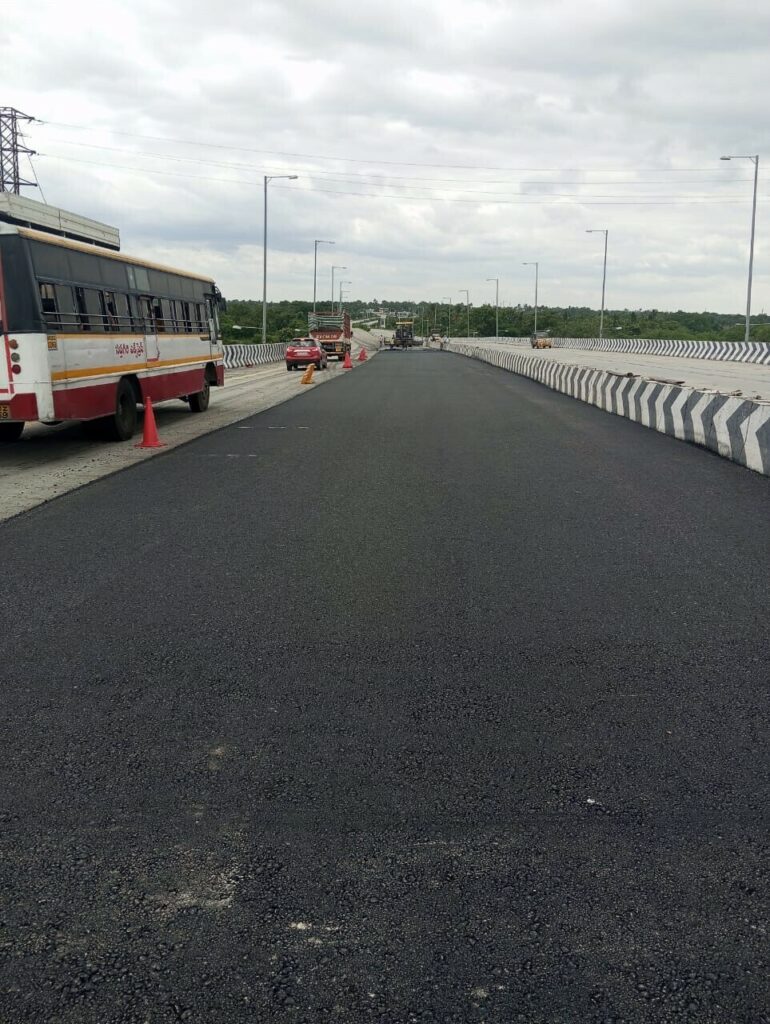Asphalt pavement
How are they built and what are their benefits?
Asphalt pavement is a composite material made of stones and sand mixed with asphalt. Asphalt is a dense, viscous, dark liquid derived from petroleum. The substance is sometimes called bitumen, a name that emphasizes its adhesive nature and its resistance to damage from water and oil. But it is important to note that bitumen and asphalt are not the same thing. Now, while bitumen is a binder, asphalt is the entire composite mixture of aggregates that include stones and sand bound together by bitumen.
What are the components of asphalt pavement?
It consists of 90 to 95% aggregates and sand, with the remaining 5 to 10% being asphalt or bitumen. This is obvious; the aggregate provides the strength of the structure, while the asphalt is an elastic adhesive. The asphalt can well glue together aggregates and sand because of its high viscosity; it is durable yet adaptable to any condition of the environment.
Why is asphalt used for pavements?
One of the greatest strengths of asphalt is its natural flexibility. When asphalt cools, it loses flexibility, but its initial flexibility allows the pavement to adjust to temperature changes and the constant motion resulting from traffic loads. It is very beneficial for regions experiencing warm, cool, or rainy weather conditions. Asphalt pavement is considered very durable and tough, making it a favorite for use under most traffic streams:
- Roadways: Highways, urban streets, and rural roads.
- Driveways: Residential and commercial properties.
- Parking lots: Ensuring smooth, durable surfaces for vehicles.
- Air strips: Withstanding the weight and speed of aircraft during takeoff and landing.
The production of asphalt pavement involves several meticulous steps to ensure quality and performance.

How is asphalt pavement installed?
1. Surface preparation
This will involve a preparation phase of site clearance, excavation, compaction, and grading. A base ensures pavement strength, stability, and surface durability; it is typically made up of a compacted stone or even more technical one such as the asphalt base.
2. Transportation
The hot asphalt mix is transported to the job site in dump trucks. Transportation must be made very fast so that the mix does not cool down prematurely.
3. Laying the asphalt
The procedure for asphalt involves depositing the material into a designated area and then compacting it onto the ground. This process ensures good bonding to adequately yield a rigid and smooth surface. Depending on the desired application and load of pavement, additional layers can be added.
What are the benefits of asphalt pavement?
Asphalt pavements offer numerous advantages that make them a preferred choice in construction projects:
1. Durability and longevity
Asphalt pavements are designed to withstand tremendous heavy loads as well as constant flows of traffic; therefore, asphalt is suitable for the busiest highways and airports.
2. Cost-effectiveness
Indeed, asphalt pavement has a relatively low initial cost compared to other materials, and its prolonged life greatly minimizes the need for recurrent repairs.
3. Smooth and safe driving experience
The smooth surface of asphalt pavements minimizes wear and tear on vehicles while simultaneously enhancing driving comfort. Additionally, it offers improved skid resistance, thereby contributing to enhanced road safety.
4. Quick installation
Asphalt paving projects are completed relatively quickly, minimizing disruptions to traffic and daily activities.
5. Recyclability
Asphalt can be fully recycled, thus providing an environmentally friendly alternative. Reclaimed asphalt retains their original properties; hence the demand for virgin material and energy consumption is thereby minimized.
Common types of asphalt pavements
1. Hot Mix Asphalt (HMA)
HMA is the most common type of asphalt used in road construction. It is produced at high temperatures, thus ensuring a strong and flexible pavement.
2. Warm Mix Asphalt (WMA)
WMA also consumes much less energy and produces fewer emissions than HMA. It is, therefore, excellent for such projects that boast about environmental friendliness.
3. Cold Mix Asphalt
Cold mix asphalt is applied in temporary repair and in areas where hot mix asphalt plants are not accessible. Though not as durable, it promises to be applied rapidly and easily.
4. Porous asphalt
Porous asphalt allows water to drain right through its surface, which reduces runoff and increases groundwater recharging. This product is often used in parking lots and driveways.
Challenges in asphalt pavement construction
While asphalt offers numerous benefits, there are challenges associated with its construction:
1. Weather sensitivity
Asphalt paving requires specific weather conditions. Extreme cold or rain can disrupt construction or compromise the integrity of the pavement.
2. Maintenance
Over time, asphalt pavements develop cracks and potholes, primarily because of heavy traffic and natural weathering. As such, the pavements necessitate timely maintenance to increase their durability.
3. Material availability
Availability of proper aggregates and bitumen may have to impact the cost and feasibility of asphalt paving works.
Asphalt pavements are the very basics of modern infrastructure. Durable, flexible, and cost-effective, these pavements have a multitude of applications, from highways to parking lots. In this sense, understanding what an asphalt pavement is, how it’s made, and what benefits it can offer makes stakeholders better decision-makers for the success of their projects. And as technology advances and sustainability becomes a priority, the outlook for asphalt pavements is good, as they will allow for the continued construction of efficient and resilient infrastructure.
